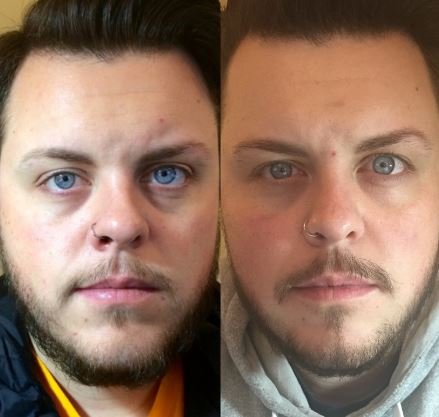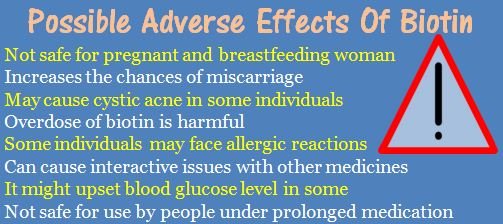Biotin Side Effects
Intake of vitamin and mineral food supplements can provide additional nutrients and prevent malnutrition. Biotin is one of the nutrients that are available through supplements. Though taking it can be beneficial, ingestion of high levels of biotin can have adverse effects [1, 2].
Biotin
Biotin is a B vitamin and a coenzyme that has an important role in the body. This nutrient is essential in the health of the digestive tract, metabolism, nerves and skin. Biotin is also seen to be able to treat some pathologies of the nerve such as the peripheral neuropathy that have occurred as a consequence of diabetes mellitus. Pregnant women are advised to take biotin supplements because it is crucial in the growth of the embryo [1, 2, 3].

Examples of food that contain biotin are whole grains, whole-grain products, peanuts, almonds, eggs, milk, cheese, organ meats, salmon, sardines, cauliflower, avocado, banana and soybeans. It is important that these food are eaten fresh because food processing destroys the biotin in the food [4, 5].
Deficiency in biotin, although rare, may cause dry scaly skin, hair loss, swollen tongue, loss of appetite, fatigue, depression and insomnia. This deficiency can be seen in individuals who may have problems absorbing nutrients such as those with Crohn’s disease [5].
Other Names
The name biotin comes from the Greek word “biotos” which translates to life or sustenance. Biotin is also known as D-Biotin, Vitamin H, Vitamin B7, Coenzyme R and W Factor [2, 3].
Recommended Dosage of Biotin
An adequate intake level has been established by the Institute of Medicine. Adolescents and adults have to take around 30- 100 mcg of biotin every day. Women who are pregnant or breastfeeding should take around 35 mcg every day. Although these are the recommended intake, a physician may advise the patient to increase the intake of up to 2 mg [3, 5].
Available Preparations of Biotin
Biotin is available as an individual supplement or in combination with other B vitamins. They are available in 10 mcg, 50 mcg, and 100 mcg. Supplements may contain simple biotin or a complex form with brewer’s yeast [5].
Indications
Hair and nail problems
Biotin supplements may be advised for individuals who have thin or splitting hair and brittle finger and toenails. Creams that contain biotin with zinc and clobetasol propionate are used as a treatment against alopecia [5].

Figure 2 – Eyelashes after few weeks using of Biotin Supplement
Diabetes
When this nutrient is combined with chromium, it is used to improve blood sugar control in those with type 2 diabetes. Biotin must be used with chromium because biotin alone does not have the same effect to blood sugar [5].
Cradle cap
Infants who have low levels of biotin experience a scaly scalp condition called seborrheic dermatitis. Although it may be beneficial, always consult a physician first before giving any food supplement to an infant [5].
Peripheral neuropathy
People who are undergoing dialysis and with diabetes my develop nerve damage in their arms and feet. There are a few studies that shows improved symptom experience to those that takes biotin. The pain, numbness, tingling and burning feeling that these people experience are minimized [5].
Other
There is a study that suggests that biotin supplementation is helpful to those that may have lost their sense of taste. These individuals take 10-20 mg of biotin daily to produce the desired effect [5].
Side Effects of Biotin
Allergies
It may be uncommon but there are individuals who may experience hypersensitivity reaction after taking biotin. Some of the symptoms that may be experience may include rash, nausea, chest pain and tightness in the throat. It is important to consult the physician once these are present because this event can be fatal [6].
Acne
Increased levels of biotin in the body may increase the risk of the development of cystic acne especially in the jawline and chin area. This symptom seem to disappear a few weeks after stop taking biotin. In order to minimize the risk for cystic acne, ensure that the amount of biotin being taken is within the recommended level and increase fluid intake while taking biotin. There may be a need to experiment with different doses of biotin to find the most appropriate dose [6].
Miscarriage
Although biotin is an important nutrient during pregnancy, excessive amounts in the body may increase the risk of miscarriage. A physician must be consulted before starting biotin supplementation to identify the dosage that should be taken [6].

Drug Interactions of Biotin
There are currently no evidence that shows that biotin interacts with other drugs but certain drugs can lower the amount of biotin in the body [5].
Antibiotics
Intake of antibiotics may lower the available amount of biotin in the body because it destroys the intestinal flora that produces biotin [5].
Anticonvulsants
Drugs such as carbamazepine, phenytoin, primidone and phenobarbital for a long period of time can lower the level of biotin in the body. Valproic acid may even cause a deficiency of biotin which can be resolved by taking biotin supplements [5, 6].
References
- Zelman, K. (2011). What Vitamin and Mineral Supplements Can and Can’t Do. Retrieved from WebMD: http://www.webmd.com/vitamins-and-supplements/nutrition-vitamins-11/help-vitamin-supplement?page=1
- Blahd, W. (2015, June 26). Biotin. Retrieved from WebMD: http://www.webmd.com/vitamins-and-supplements/lifestyle-guide-11/supplement-guide-biotin?page=2
- Stevens, C. (2015, May 1). The Benefits of Biotin. Retrieved from Healthline: http://www.healthline.com/health/the-benefits-of-biotin#Overview1
- Srivastava, M. (2014, January 8). A List of Biotin-Rich Foods. Retrieved from Live Strong: http://www.livestrong.com/article/437532-a-list-of-biotin-rich-foods/
- Ehrlich, S. (2013, July 16). Vitamin H (Biotin). Retrieved from University of Maryland Medical Center: http://umm.edu/health/medical/altmed/supplement/vitamin-h-biotin
- MD-Health. (2016, April 29). Biotin Side Effects. Retrieved from MD-Health: http://www.md-health.com/Biotin-Side-Effects.html
